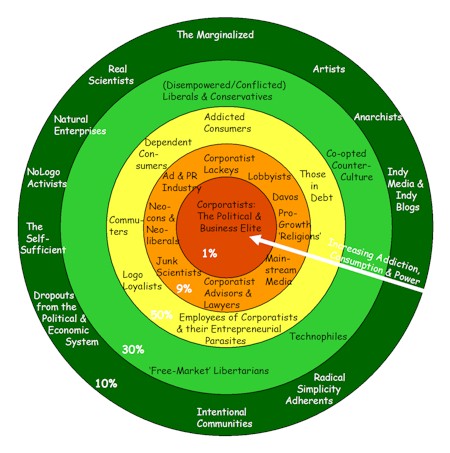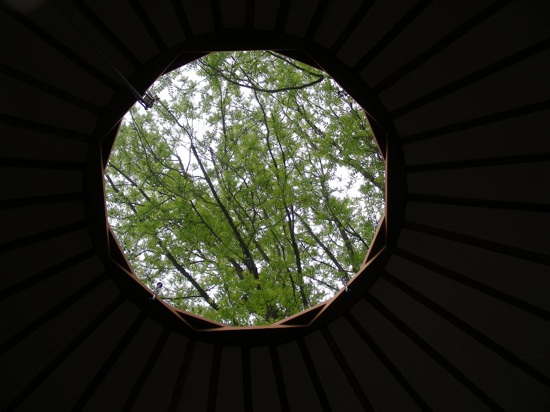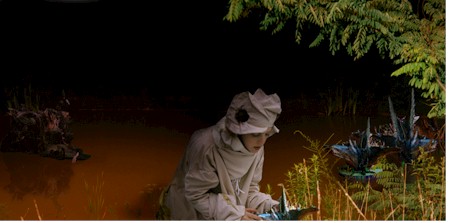 graphic from my earlier post living on the edge
If we all behaved authentically, I think, we would show who we really are — damaged, vulnerable, imprisoned, addicted. We would not be able to sustain the veneer of civilization. We would see all our dominant systems — the political, economic, business, educational, social, health and other systems — as bankrupt, corrupt, worthless, exploitative, and destructive. And we could then no longer tolerate them. We would have to make them over, bottom up and outside in, redesign them from scratch, collectively, to be responsive and responsible, sustainable and collaborative and modest, with the logic of sufficiency. If we all behaved authentically, we would see the damage that our institutional education system does to young people, and that our business and economic systems do to those the education system spits out, people subjugated, repressed, cowed, brainwashed, pounded into obedience and conformity, wounded, crippled, mentally ill actors pretending desperately nothing is wrong. I have spent the last week in Oregon, which seems to have significant, overt subcultures of people who act authentically — non-conformists, drop-outs, activists, wide-eyed idealists, rugged realists, communitarians, homeless people, and artists and anarchists — all refusing to pretend that the civilization culture that the mainstream of our society bows to and obeys, actually works. I am sure such subcultures exist everywhere, but I have just not noticed them much before. In the last week I have started to learn to become present, to really pay attention, to start to be, again and at last, nobody-but-myself. It’s perhaps wrong even to call these groups ‘subcultures’, because they participate only marginally in the mainstream culture. They are a hive of independent communities doing self-organized and self-managed experiments in other ways to live and make a living. Millions of people, perhaps all living out there, somewhere, on the Edge. Some of these ‘edgelings’ are doing very well, and when the crash of civilization comes they will probably thrive, because unlike most of us they do not depend on civilization culture. They are connected, in community with like minds, physically and virtually. Others are not doing well. They remind me of many of the street people I have met, all over the world, people who could not integrate into mainstream civilization culture if they wanted to, but who also seem to lack the survival skills, the creativity and learning and collaborative skills, needed to live outside that culture. Like the poor and sick in the belly of mainstream civilization culture, these disconnected Edge residents will face terrible hardship when that culture slams into the wall of excess and unsustainability. I believe we are all a hair’s-breadth from the Edge. The yokes that keep us all in thrall to the Centre are worn and crumbling and held together with the most tenuous glue. Coming to live on the Edge, I think, is a multi-determined journey — there are more and more factors beginning to push us out of the comfortable pew where we mostly once worshipped our species, our ‘leaders’, our civilization, our perception of unlimited human capacity and entitlement and manifest destiny.* I don’t think those on the Edge are what Ray and Anderson call “cultural creatives” (or, worse, what Florida calls the “new creative class”) — I don’t believe any of the “rising collective consciousness” arguments, and there’s a disturbing degree of romantic self-congratulation, facile mutual reassurance and almost desperate membership-seeking in a lot of these models, movements, and cults. People have, instead, arrived at the Edge because they never fit into (and fled), or were pushed out of, the Centre. As the industrial economy reels and falters, there is now less room in the Centre. And as van der Post said: if we hope to help others reconnect, enough others to make a difference at this critical point in our evolution, we must first make the journey alone, and then draw others out with us, rather than pushing them to make the journey with us. We can see these People Who Have Journeyed to the Edge, these authentic people, either as tragic non-conformists, ‘system failures’ who couldn’t or didn’t care to ‘get theirs’, or we can see them as bioneers, as ‘lead-ers’ in the true sense of those going ahead, showing the way, inviting us to be with and be authentic with them. These Edgelings look at you, and at the world, with different eyes than those who are still imprisoned in the Centre. Like the wild children who never learned language and hence the neurons in their brains formed in ways that were sensory and intuitive rather than reductive, and therefore were immune to the cultural indoctrination that requires and uses language as a club and a scalpel, they look at you authentically (= M.L./Greek being oneself). They cannot help being honest, empathetic, raw, real. They see what is really happening. They care. They do what they feel and know to be right, for them, not what they are told. If they have arrived at the Edge late in life they probably have a quiet knowledge of what they have left behind, and its dangers, and they are protective, accommodating to new arrivals — filled with a great sadness, a consuming grief. If they are younger, instinctive migrants rather than battle-weary, wary survivers of the relentless propaganda and warfare of the Centre, they are astonishing — perceptive rather than conceptive, imaginative rather than analytical, and they are uninhibited, alert, in the moment. They are also naive, vulnerable, guileless, unpretentious. Like birds in the wilderness, they are fear-less. They learn by trying and by practice, not vicariously by being told. They accept responsibility for the consequences of their own actions. They do not blame others. I have no idea if any of the above is true. It is just what I sense, now, for the first time. I am still trying to ‘make sense’ of it. Bear with me. If we all behaved authentically, civilization would be over in a heartbeat. We would all just walk away, and start trying other things, experimenting, relating, loving, caring, learning, rediscovering what our senses teach us and what our intuition knows, doing what’s important. Maybe this is how past civilizations have ended, suddenly, mysteriously, when more and more people, fleeing or pushed out to the edge, just walked away from systems that no longer served them. Not a creative reinvention or re-formation of culture, but a rejection of culture, not a Wilberesque ‘integration’ but a disintegration. A breaking apart. A flying apart. A flying away. * “Our manifest destiny is to overspread the Continent allotted by Providence for the free development of our yearly multiplying millions.” — John O’Sullivan 1845 |







Very nice. It feels like a lot of people might be looking edgewards these days, wondering just how fucked-up and bad it’s going to be out there. From the centre looking out, it looks like a big scary drop; but I think that the further out you get the more you realize that the centre’s no place to be. Civilization is creating its own diaspora.I feel like someone who could have — should have fit better closer to the centre, but somehow never quite did. I can’t explain that any better than to say that it’s just how I am. But I spent a lot of years waffling about in there, unable to start to look outwards and find my true place. Now I’m getting a sense of what that is, but I still feel the centripetal tug all the time. Maybe it’s getting weaker as time goes on, but every day the inward and outward forces are in a new configuration. Awareness of what’s going on is a good start to being able to deal with the mood swings. :-)It’s too bad that something like your model isn’t part of the collective stories we tell about the picture of the society we live in. Talking about this in brute terms like “left” and “right” or “upper class” vs. “lower class” is so completely pathetic, but that’s all we really have. Well, for now, anyway.
I couldn’t help imagining that the people on the edge of society are like the early mammals scurrying around the huge feet of the dinosaurs that dominated the planet with their monoculture.The mammals were just waiting for their chance. Everything on the edge waits for a chance to invade the centre. And a huge asteroid is burning its way through the atmosphere…
It is sad to see how, while the “first world” begins to wake up from the consecuences of their “monoculture” (using Ivor´s words), here in our third world, people still buy the belief that we must reach there (first world development ways)to be happy… you can see natural comunities, beautiful andean and amazonian rainforest towns, feeling proud of all the concrete buildings and monuments built as a sign of progress.. Globalization is doing its work, and the multicultural richness that countries like Peru have.. may disappear soon…. No doubt this is a very intense moment for our evolutive path.. ¿will we run out of water? will the amazon rainforest turn into a sabana? will genetic modified seeds or mutant bacterias and viruses play an important role in exterminating our specie… hmmm… I will soon be a grandmother… many ideas and questions, about what my grandson will need to face the future, dance in my head… hmmm…
One of your best posts Dave – I wonder did the Maya just walk into the jungle?
W!O!W! Thank you.I just found your site through Colleen Wainwright’s blog, and I am grateful.I actually feel hopeful about our current state of upheaval and disintegration. I think it’s time for these dysfunctional institutions to crumble. If things stayed just comfortable enough … then very few would be willing to go out to the edge. As it is, the caving in of the center is waking people up. It’s causing them to question its validity, and their own attachment to it. This is a good thing. All transitions are difficult. This is a global transition of consciousness we’re entering, and it’s not going to be pretty for a while. And then, one day, it will be.It’s cool that more and more people are getting it. I lived in Portland for 18 years. I get what you mean about the Oregon vibe. Love it! Must be a vortex or something… created by all that rain… which is why I live in San Diego now. Great weather; not such a great vibe, though. After ten years here, it’s starting to feel like not the best trade-off.Thanks again for the great post. I’ll be back!
perhaps “edge” and “center” as used each define the other, and in that way are the same thing, just two sides of the coin … where an edge can become a new center is what is interesting … god knows the status quo is both boring and destructive … enjoy, gregory
“”Some of these ‘edgelings’ are doing very well, and when the crash of civilization comes they will probably thrive, because unlike most of us they do not depend on civilization culture. They are connected, in community with like minds, physically and virtually.Others are not doing well. They remind me of many of the street people I have met, all over the world””Your point reminds me of a thought that have passed through my brain many times in Paris streets, and subway: “why are are street people looking so ugly, with void eyes, unble to speak clearly, to walk gracefully, and so often drunk?” and I often felt that most were mentally ‘ill’. I remember you posted long time ago about mental illness as a consequence of civilisation. I guess these ‘not-doing-well’ ‘edgelings’ are the produce of civilisation: human junk (that’s why so many people ignore them, don’t wanna see them, neither acknoledge their true nature), while the ‘doing well’ ‘edgelings’ are mentally, and physically, fit enough to survive by themselves.
Amazing conversations flowing from this post — thanks to all commenters and e-mailers. Expect more of this kind of stuff in 2009, the new Earthier Dave Pollard :-)